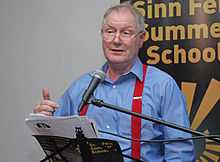Roy Greenslade
| Roy Greenslade | |
|---|---|
|
Greenslade in 2013 | |
| Born | 31 December 1946 |
| Occupation | Journalist and academic |
| Spouse(s) | Noreen Taylor |
Roy Greenslade (born 31 December 1946) is Professor of Journalism at City University London[1] and has been a media commentator since 1992, most notably for The Guardian. He currently writes a daily blog on The Guardian media site and also writes a column for the London Evening Standard.[2]
Early life
He was educated at Dagenham County High School (1957–63) and, aged 17, was hired by the Barking and Dagenham Advertiser. After serving a three-year indentureship he joined the Lancashire Evening Telegraph in Blackburn as a sub-editor before spending 18 months as a sub at the Manchester office of the Daily Mail.
Career
The Sun
In 1969, he went to Fleet Street as a news sub on The Sun, which had just been acquired by Rupert Murdoch. He had a brief spell with the Daily Mirror in 1972 before returning to The Sun as deputy chief sub-editor, first with the news desk and later in the features department.
He left The Sun in 1974 to write his first book and to take a degree in politics at the University of Sussex. He worked his way through university with part-time subbing jobs at the Brighton Argus, BBC Radio Brighton, the Sunday Mirror and Reveille. After graduating in 1979, he joined the Daily Star in Manchester for six months until being seconded to the Daily Express in London. He was soon appointed features editor of the Daily Star.
In 1981 he returned to The Sun as assistant editor. He was very involved in the move from Fleet Street to Wapping. Five years later, he transferred to The Sunday Times, first running the Review Section before becoming managing editor (news). In 1990, he was appointed by Robert Maxwell as editor of the Daily Mirror. He departed in March 1991 and later that year was consultant editor for three months to both The Sunday Times and Today.
The Guardian
From 1992 until 2005 he was media commentator for The Guardian. He then spent six months with The Daily Telegraph in a similar capacity before returning to The Guardian to launch a media blog and began to write a weekly media column for the London Evening Standard. He presented BBC Radio 4 's Mediumwave (1993–95) and in 1996 was the launch presenter of Britain Talks Back on Granada Talk TV. He is a regular broadcaster on media matters.
Irish republicanism
During the late 1980s, when he was managing news editor of The Sunday Times, he secretly wrote for An Phoblacht, a newspaper published by Sinn Féin.[3] His pseudonym was 'George King'. This was exposed by Nick Davies, a Guardian colleague and instigator of the journalistic investigation into phone hacking. When Greenslade reviewed Davies's book on his blog in 2008, he did not deny his writings for An Phoblacht.[4] Greenslade also spoke at a Sinn Féin conference in London on the 30th anniversary of the hunger strikes, and he wrote an article on the same subject for An Phoblacht . He has had a house in County Donegal for many years, and a close personal friend is Pat Doherty, who from 1988 until 2009 was vice president of Sinn Féin, and who has been publicly named as a former member of the IRA Army Council.[5]
Other work
He is on the board of the academic quarterly, the British Journalism Review, and is a trustee of the media ethics charity, MediaWise. In 2003, he was appointed Professor of Journalism at City University London in succession to Hugh Stephenson.
Greenslade has been credited with coining the term: The Hierarchy of Death as well as writing extensively on the subject.[6][7]
He is also the author of three books, Goodbye to the Working Class (1976), Maxwell's Fall (1992) and Press Gang: How Newspapers Make Profits from Propaganda (2003).
Personal life
Greenslade divides his time between Brighton and Ramelton, County Donegal, Ireland. He is married to Noreen Taylor, the former Daily Mirror journalist and mother of actress Natascha McElhone.[8]
References
- ↑ "Academic Experts". City University London. Retrieved 23 June 2014.
- ↑ "British journalist Roy Greenslade stands surety for IRA man". The Irish Post. 7 March 2014.
- ↑ http://www.theguardian.com/media/greenslade/2014/nov/03/irish-times-gerryadams?CMP=share_btn_fb
- ↑ "Stephen Glover: The Troubles are still raging for The Guardian's media pundit". The Independent. 12 March 2012.
- ↑ "Ruth Dudley Edwards: The strange case of the two Roy Greenslades". Irish Independent. 18 March 2012.
- ↑ "Sian murder says a lot about media's values". London Evening Standard. March 30, 2011.
- ↑ Owen Jones (2013-04-21). "Owen Jones: Our shameful hierarchy - some deaths matter more than others - Comment - Voices". London: The Independent. Retrieved 2013-04-29.
- ↑ "Comedy role for X-Files star Duchovny". The Guardian. 17 March 2007.
External links
- The Media in the Digital Age - an address by Roy Greenslade to the NZ Foreign Correspondents Club in Auckland, 5 December 2006. (This link is dead)
- Guardian Article Roy Greenslade & Arthur Scargill
- Roy Greenslade's page at The Guardian
- Roy Greenslade's page at the London Evening Standard
| Media offices | ||
|---|---|---|
| Preceded by Richard Stott |
Editor of the Daily Mirror 1990–1991 |
Succeeded by Richard Stott |
| ||||||||||||||
|
